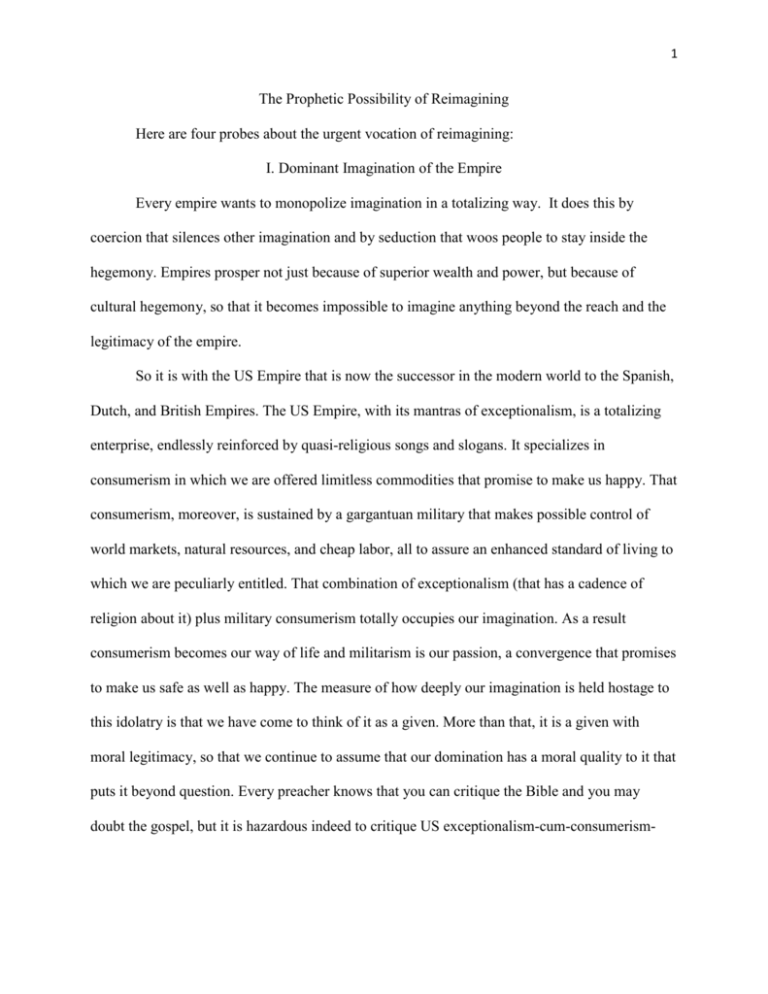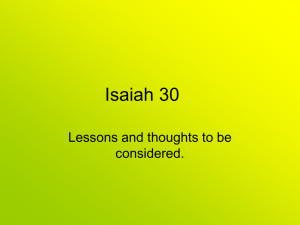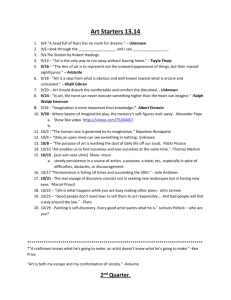The Prophetic Possibility of Re-Imagining
advertisement

1 The Prophetic Possibility of Reimagining Here are four probes about the urgent vocation of reimagining: I. Dominant Imagination of the Empire Every empire wants to monopolize imagination in a totalizing way. It does this by coercion that silences other imagination and by seduction that woos people to stay inside the hegemony. Empires prosper not just because of superior wealth and power, but because of cultural hegemony, so that it becomes impossible to imagine anything beyond the reach and the legitimacy of the empire. So it is with the US Empire that is now the successor in the modern world to the Spanish, Dutch, and British Empires. The US Empire, with its mantras of exceptionalism, is a totalizing enterprise, endlessly reinforced by quasi-religious songs and slogans. It specializes in consumerism in which we are offered limitless commodities that promise to make us happy. That consumerism, moreover, is sustained by a gargantuan military that makes possible control of world markets, natural resources, and cheap labor, all to assure an enhanced standard of living to which we are peculiarly entitled. That combination of exceptionalism (that has a cadence of religion about it) plus military consumerism totally occupies our imagination. As a result consumerism becomes our way of life and militarism is our passion, a convergence that promises to make us safe as well as happy. The measure of how deeply our imagination is held hostage to this idolatry is that we have come to think of it as a given. More than that, it is a given with moral legitimacy, so that we continue to assume that our domination has a moral quality to it that puts it beyond question. Every preacher knows that you can critique the Bible and you may doubt the gospel, but it is hazardous indeed to critique US exceptionalism-cum-consumerism- 2 militarism. In such an environment of captive imagination, it is well nigh impossible to reimagine any future in an alternative way. II. Counter-Imagination as Subversion Alternative imagination outside that captive, domesticated imagination of the empire both refuses and contradicts the claims of dominant ideology. It is surely true that nothing seriously different will come among us until we imagine alternatively. I will identify four factors that I believe are essential for counter-imagination that refuses the givenness of the empire and that can entertain an alternative construal of the possible. 1. Counter-imagination must be rooted in a distinct generative tradition. It will not arise, I believe, out of generic good intention. It requires appeal to some credible interpretive tradition that has vitality over time. Foremost among the traditions that may authorize new social imagination is the biblical tradition as it has been cherished and interpreted in specific faith traditions. The narrative, song, and oracle that constitute the substance of biblical faith refuse modernist rationality and dare attest a world of social possibility that the empire has long since declared to be impossible, dismissing such claims as either crazy or treasonable. That tradition pivots on transformative emancipation. It is rooted in the Exodus narrative that is a paradigmatic tale that is always again reperformed in the face of empire. Thus Pharaoh becomes an icon and cipher for every power arrangement that exploits, oppresses and makes abundant life impossible. That narrative begins in honest groaning that refuses the silencing of the empire (Exodus 23-25). Indeed, Pharaoh had to die before the cries of anguish could break the silence. That narrative ends with Miriam and the other women singing and dancing with tambourines that Pharaoh has been defeated and there is new historical possibility (Exodus 15:20-21). This narrative attests to an impossibility that permits new social relationships to 3 emerge. It moves on to the abundance of manna that denies the scarcity of Pharaoh or of wilderness, and culminates at Sinai with “ten rules” for an alternative society as a neighborhood. That narrative has behind it the ancestral stories of Genesis in which, in each generation of Sarah, Rebekkah, and Rachel, God does the impossible by creating an heir and a future where none had been in purview. In Christian tradition, that narrative has in front of it this Nazareth interruption that alarmed the authorities of the status quo empire. When Jesus was asked about his identity and his credentials, he responded: Everywhere I go, newness happens: The blind see, the lame walk, the deaf hear, the lepers are cleansed, the dead are raised, the poor rejoice (Luke 7:22). Who knew? Who knew that the reperformance of this emancipatory narrative is the ground of historical newness? 2. That tradition, and surely every particular generative tradition, features some agency of holiness that is, some attestation of the will and purpose of God. That is very difficult in the reasoning of secular Enlightenment context. Reimagining is primarily a theological issue, that, to ask, “What is the Holy Resolve out beyond us that may propel newness?” Agency of this kind is an acute intellectual embarrassment in a society that takes Richard Dawkins so seriously, so that we may best talk softly with se3eminhgly innocuous gentleness about the “stirring of the spirit”. But however we say it, -It is clear that Moses was dispatched to the court of Pharaoh by Holy Resolve (Exodus 3:10). -It is clear that barren women birthed heirs by a Power other than their own (Exodus 1:15-22). 4 -It is clear that Jesus and his transformative acts tapped into Originary power that is beyond explanation (Mark 1:27). Thus our reimagining may ask in big terms, “What is the deep, holy resolve to which we are summoned that will command us beyond the contours of empire to the socially impossible? The God who so command is not an idol, but one who, in the words of the Psalm, “does whatever he pleases” (Psalm 115:3). 3. That force of holy Resolve issues in risk-taking human agency. Thus in Exodus 3, after YHWH in rather bombastic fashion announces what YHWH will do, that holy one then says to Moses, “You [not I!] you go to Pharaoh” (v. 10). Holy power calls out human agency, and human agents think, imagine, and act beyond the permits of empire. They thereby break the spell so that empire is no longer seen as a given, but as an opportunistic construction of social power that can be deconstructed. The work of reimagining is not just theoretical speculation; it very quickly entails generative action that performs social possibility with energy, courage, imagination, and smarts. Thus Matthew, for example, can have God (quoting Hosea) say, “Out of Egypt I have called my son” (Matthew 2:15). That human agency called out and empowered might be quite public and dramatic, like Martin Luther King at the kitchen table (“Do not fear, Martin”). Or it might be local and mostly unnoticed. We do our imagination with our bodies, even though the empire always wants to recruit our bodies into the rat-race of production and consumption. 4. The tellers of these narratives and the singers of these songs and the human agents who reperform the narratives and songs are not simply emotive zealots. Reimagining as the reperformance of emancipatory narrative requires shrewd social analysis. Reimagining must be acutely informed about social reality and the facts on the ground. This is a facet of the ancient 5 prophets of Israel that is often not fully appreciated. Their witness indicates that they paid attention to the leverage of power and the control of money, and to the force of dominant ideology that regularly said in liturgical cadence, “peace, peace” when there was no peace. So the prophets knew about: -selling the poor for a pair of shoes (Amos 8:6); -economic self-indulgence that so narcoticizes that there is no notice that society is going to hell in a hand-basket (Amos 6:4-6); -catching poor people like a bird in a cage (Jeremiah 5:26-28); -false religion that refused to pay workers a decent wage (Isaiah 58:3). So now, reimagination must do its homework about the impossibility of a viable, sustainable human future when economic wealth is poorly distributed and unregulated, when social control and domination are couched in phony piety, and when social differentiation is dismissed as “class warfare.” Thus I suggest that the emancipation of captive imagination depends upon: -a generative narrative tradition; reimagination is not and cannot be just free lance speculation. -a Holy Resolve in which imagination is in sync with the moral tilt of creation; reimagination is not just a good idea of well-intending people; -a vigorous human agency that embodies a transformative vision; reimagination is not a thought but a practical action; -a wise practical social analysis; reimagination is not romantic wishing. III. Reimagining in the tradition of Israel 6 I will exposit reimaging as a model as it is performed in the tradition of ancient Israel. It is Isaiah, more than any other book of the Old Testament, which provides a map and model for reimagining. Isaiah imagines the painful ending and humiliation of Jerusalem and then he imagines a different restored Jerusalem. He does so under the rubric of the gospel,” for he is the first to use the term “gospel” in a technical sense, a usage that permits us to conclude that reimagination is an act of “good news.” Thus in 40:9: Get you up to a high mountain, O Zion, herald of good tidings. Lift up your voice with strength, Jerusalem, gospel herald, Lift it up and do not fear, Say to the cities of Judah, “Here is your God.” Or more familiarly: How beautiful on the mountain are the feet of the messenger, Who announces shalom, Who brings gospel news, Who announces salvation, Who says to Zion, “Your God reigns” (52:7). The substance of these utterances is that they interrupt both the arrogance of the Babylonian Empire and the despair of displaced Israel. The mantra of new imagination is: Here is your God (40)! Your God reigns (52:7)! 7 The interruption is a rhetorical act. It is the articulation of Holy Resolve that eventuates in homecoming, albeit homecoming to a new home. “Homecoming to a new home” is a compelling way to think about reimagining, the prospect of leaving “here” and going “there,” and the possibility of a very different the new home will be in contrast to the old home. I suggest that the book of Isaiah is Israel’s best script for reimagining exactly “homecoming to a new home”: -At the beginning the book of Isaiah imagines: Out of Zion shall go forth Torah, They shall beat their swords into plowshares And their spears into pruning hook. Nation shall not lift up sword against nation, Neither shall they learn war anymore (2:1-4). This is an act of amazing imagination that anticipates an end to all business as usual among the nations. -At the end the book of Isaiah imagines: I am about to create new heavens and new earth, …for I am about to create Jerusalem as a joy. Jerusalem as a joy will be very different from Jerusalem as ruin, or as a tribulation, or as a venue for conflict and exploitation. -And in mid-point the book of Isaiah imagines: On that day there will be a highway from Egypt to Assyria, and the Assyrians will come into Egypt and the Egyptians into Assyria, and the Egyptians will worship with the Assyrians. On that day, Israel will be the third with the Egypt and 8 Assyria, a blessing in the mist of the earth, whom the Lord of Hosts has blessed saying, “Blessed be Egypt my people, and Assyria the work of my hands, and Israel my inheritance. (19:23-25). Two things are clear in this mapping of reimagination in the book of Isaiah: -First, it is all poetry; it is not memo, blueprint, or program. It is an act of artistic imagination. -Second, each of these poems of imagination contradicts settled imagination that has been taken as given in that ancient society: a) At the outset we may be sure that the power people did not want to think about disarmament as in the poem of 2:1-4... b) At the end, we may be certain that urban managers did not want to entertain a Jerusalem beyond their management horizon as in the poem of 65:17-25). c) In between, the advocates of the nation-state did not want to think that there may be other chosen peoples along with us as in the vision of 193-25. In Isaiah we are offered an artistic sketch of alternative possibility that does not accommodate any present social arrangements. This is imagination out beyond all present possibility. It is especially at the far end of the book of Isaiah (likely in the Persian period) that the book of Isaiah begins to sketch out this counter-imagination of the new home to which there will be homecoming. a) The new home imagined by Isaiah is for folk who are under summons. Already in chapter 1, as Isaiah imagines a future, we are given nine imperatives that are the conditions for a viable future: 9 -wash yourselves; -make yourselves clean; -remove evil from before my eyes; -cease to do evil; -learn to do good; -seek justice; -rescue the oppressed; -defend the orphan; -plead for the widow (16-17). The sweep of this series of mandates begins in the purity of worship and moves to a passion for the vulnerable in the economy. On both counts, pure worship and passion for the economically vulnerable, the future will not be a replica of the past. b) With that as a beginning for Isaiah, the matter gets specific in later Isaiah as the poet imagined the reformulation of Jerusalem. In chapter 56, there is a debate about membership, who is in and out. “Pure worship” sounds exclusionary. But here, in chapter 56, such worship will include eunuchs and foreigners (vv. 3-6). Include those whom Moses in the Torah had excluded; include those with compromised genitalia after Moses had excluded those with crushed testicles and cut off penises, and perhaps other sexual irregularities as well (Deuteronomy 23:1-2). Include foreigners beyond our tribal homogeneity, outsiders who threaten identity, the very ones Moses had excommunicated to the tenth generation Deuteronomy 23:3-6). Include them with only one specific condition, that they keep Sabbath, that they do work stoppage and refuse to participate in the rat-race of endless production and consumption (Isaiah 56:4, 6). Include those outsiders, let them be joyful in prayer and sacrifice, for 10 My house will be a house of prayer for all peoples (Isaiah 56:7). c) They had a debate about proper worship; for they knew about the punctilious regulations of the book of Leviticus. But in Isaiah 58 the poet reprimands the pious who presume upon God in their delight in worship, but who oppress their workers with low minimum wage and cheap labor (vv. 3-4). The poet reimagines worship beyond pious regulation. Fasting, an exhibit of discipline, takes the form of neighborly emancipation: Is not the proper fast… To let the oppressed go free, and to break every yoke? Is it not to share your bread with the hungry, to bring the homeless into your house, to provide clothing for the naked, that is, to expend resources for the vulnerable and exploited? Such worship that is neighbor-love will connect to YHWH. It is all bodily well-being: Then you shall call and the Lord will answer. You shall cry for help and I will say, “Here I am” (v. 9). “Then”…perhaps not until “then”! d) They had a debate about debts and mortgages and foreclosures and high interest rates (chapter 61:1-4). Some argued that the indigent should be in prison, in order to maintain economic stability, no doubt an ancient version of “the new Jim Crow.” But then came the rush of God’s spirit that broke such stability open. “The spirit of the Lord is upon me.” The spirit violated conventional order: -to bring good news to the oppressed (debt cancelation); 11 -to bind up the broken hearted (who despair as they are left behind); -to release prisoners who are their because they lacked good lawyers); -to enact the year of the Jubilee. In this act of imagination, Israel is invited to new actions that will yield Garlands instead of ashes, Gladness instead of mourning, Praise instead of a faint spirit (v. 3). And then: Build up… raise up former devastation, Repair ruined cities (v. 4). Break old patterns of control for the sake of the public good. e) By chapter 65 the poet seems to go berserk in reimagining a new heaven, a new earth, and a new Jerusalem. Coming soon is a city with no foreclosures on vulnerable property (vv. 21-22); Coming soon is a city with no infant mortality (v. 20); Coming soon are children who are not born in social calamity (v. 23); Coming soon is the God who is as attentive as a vigilant mother: `Before they call, I will answer (v. 25). Coming soon is a reconciled environment: The wolf and the lamb, The lion and the ox. They shall not hurt or destroy in all my holy mountain (v. 25). f) Coming finally is a world well held, says the poet, by the mothering God: 12 I will extend prosperity to her like a river, And the wealth of nations like an overflowing stream, and you shall nurse and be carried in her arm, and dandled on her knees. As a mother comforts her child, So I will comfort you, And you shall be comforted in Jerusalem (66:12-13). This collage of poems in Isaiah spreads before us a New Jerusalem in a reordered world. It is all poetry. It is reimagining. It is all gift. It is all God’s resolve, yet it is to be performed in the real world. But consider: without this poetry of reimagining, -there would have been only exclusion…contra chapter 56; -there would have been only piety with oppression…contra chapter 58; -there would have been endless imprisonment for debts…contra chapter 61; -there would have been only old heaven, old earth, and old, tired, Jerusalem…contra chapter 65. -there would have been no comfort for the city, but only weariness, coercion, and hostility…contra chapter 66. Without reimagining, Jerusalem would have been fated to an old, sad forlornness. The poetry disrupts what seemed forever, breaking open the possibility of the God who lives on the lips of the poet! IV. Our Contemporary Vocation of Reimagining The vocation of reimaging is a task for risk-taking boldness that is sure to offend all old certitudes, all treasured ideologies, and all reliable stabilities. We are in the wake of Isaiah and of 13 Jesus (and of Martin and Desmond and Nelson and now Francis) who foreshadow a social world of neighborliness that no longer required keeping some in long-term disability. Thus already in Mark 3:1-6, as soon as Jesus healed and made a new world possible by his transformative performed imagination, the urban elites conspired how to kill him; they resisted his active reimagining of a healed world. The present task, like those ancient performances, is to enact counter-imagination, counter to present power assumptions about privilege, entitlement, exceptionalism, consumerism, and militarism, all of which are taken as givens among us. We will each have our own agenda, but surely the agenda is to reimagine our planet and our society as a neighborhood. So here are four quick forays into the new neighborhood: 1. We may reimagine a new network of internationalism that features disarmament after the manner of plowshares and pruning hooks, a serious work of peace-making governance. Such an act of imagination would necessarily eschew US exceptionalism that treats our massive military power as a moral exceptional. We may take our cue from President Putin who recently chided US exceptionalism and rightly asserted, after Isaiah 19, that there are many “chosen peoples.” Of course a serious network of international peace-making is an impossibility, and giving up US exceptionalism is an even greater impossibility; but reimagining dare not be limited to the possible. 2. We may reimagine a culture that welcomes others. Such a culture would break beyond our convenient tribalism to make glad room for those unlike us, culturally, ethnically, in terms of sexual orientation, in ideological difference, in every way different. Such an imagining would require moving beyond the safety of sameness, in order to recognize what Martha Nussbaum calls “The Clash Within,” the clash each of us carries within between an openness of welcome to 14 the others and a tribal fearfulness of the other. Such an act of othering asserts, after Isaiah’s welcome to eunuchs and foreigners, that God gathers all to one common table. Thus says the Lord God, who gathers the outcasts of Israel, I will gather others to them besides those already gathered (Isaiah 56:8). Such a welcome is in the wake of the astonishing decision of the early church to admit Gentiles who, at first, seemed even to Peter to be “unclean.” But of course God rebuked Peter: “What I have called clean you cannot treat as unclean” (Acts 11:9). Such an act of otherness is impossible, given the fear, anxiety, and resentment that permeate our society; but reimagining dare not be limited to the possible. 3. We may reimagine an economics of neighborliness. Such an act of reimagining would break with market ideology that sets neighbor against neighbor as competitor and threat, an ideology that believes that “more is better” and “faster is better” and bigger is better.” Market ideology has given legitimacy to the act of the big ones devouring the little ones, and creditors devouring debtors. Such a new economy follows the vision of Isaiah that serious religion insists on freeing debt prisoners, on providing food [stamps!], clothing, and shelter to the oppressed. That is, it is a dream of the common good that not only eschews rabid lethal individualism, but that provides a social infrastructure based on debt relief that permits a viable life for all members of the community. Of course such a break beyond market ideology for the sake of a neighborly economy that must necessarily be local is impossible among us; but reimagining dare not be limited to the possible. 15 4. We may reimagine a new ecumenism that recognizes the legitimacy of other religious confession alongside our own. We are learning, albeit slowly, that the presence of a Muslim neighbor, for example, requires that our most treasured theological certitude must be formulated differently, not abandoned, but reformulated. We all know that letting one “other” come to the table--one woman, one African American, one Jew, one gay person…any “other” who interrupts the sameness of dominant culture--requires that we talk differently. We Christians will continue to confess Jesus as Lord and Savior. We will learn, however, to say it differently, to allow for the awareness that God saves and delivers in many modes, and that even our Christian claim has no monopoly on the truth. We will cling to our confession, but we will imagine ways of articulation that make room for others. We will learn from others unlike us and be changed by them. Such a move is consistent with the verse that Micah adds to the poetry of Isaiah concerning plowshares and pruning hooks. After he quotes that poetry, Micah adds a new verse, For all the people walk, Each in the name of its god, But we will walk in the name of YHWH our God, forever and ever (4:5). Yes we will! We Christians will forever take the precious name of Jesus with us. But we will notice that our fellow travelers walk alongside in the name of other gods. Such a new ecumenism that isn’t just sweet politeness is hard to imagine in our society, given our sectarian passion and our vigilance about selling out and compromising our absolutes; reimagining dare not be limited to the possible. V. We have what is needed for this vocation 16 Surely it is time for reimagining, because the old imagination that has governed us has failed. It has not made us safe or happy. It is time--with energy, courage, and the guidance of the Spirit--to break the captivity of old imagination. We are well equipped to do it: a) We have a tradition that is endlessly generative when it is not reduced to fundamentalism or to progressive criticism. b) We have a conviction about Holy Resolve, knowing that “God’s ways are not our ways.” c) We have among us forceful, compelling human agents, not least Francis, who may lead us beyond old captivities. d) We have the tools and the smarts to engage in deep social analysis, so that we can identify the ideologies that skew our common life in the world. We have the prerequisites for the newness of Isaiah…new heaven, new earth, New Jerusalem, new society. We may undertake poetry not unlike the script of Isaiah. Such work may indeed yield: a) a new network of peacemaking internationalism beyond our chosenness; b) a new culture that welcomes others beyond our tribalism; c) a new economy of neighborliness beyond our desire to consume endlessly; d) a new ecumenism that engages fellow travelers with their legitimate confessional claims beyond our settled absolutes. As we walk “in the name of YHWH our God forever and ever,” we are aware in compelling ways that this God, fleshed in Jesus of Nazareth, is always summoning and empowering to new possibility that the empire say is impossible. As Gabriel declared to Mary, “Nothing will be impossible with God” (Luke 1:37). 17 Walter Brueggemann Columbia Theological Seminary This paper presented at a conference on “Reimagining” at Georgetown College, January 9, 2014







